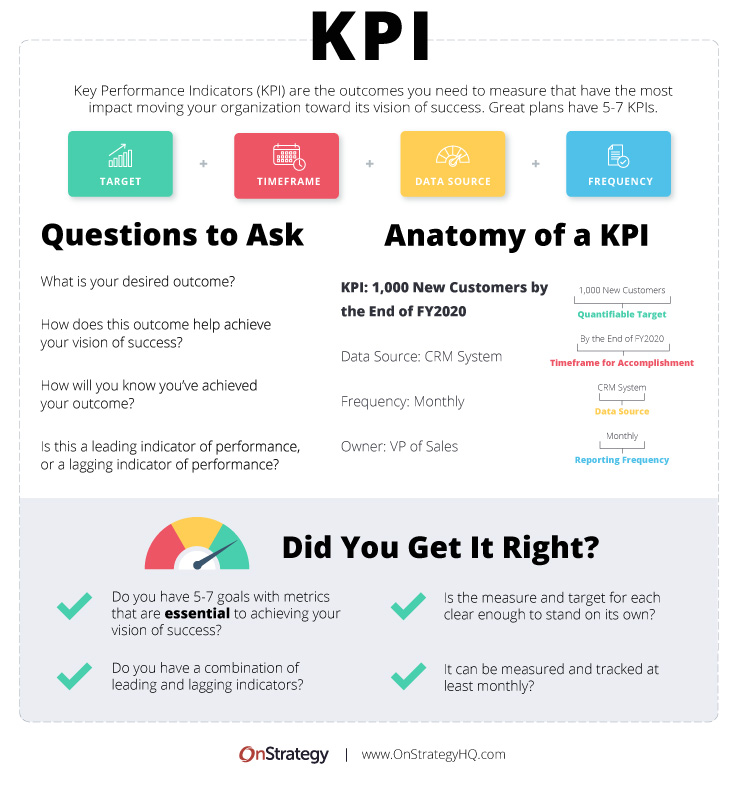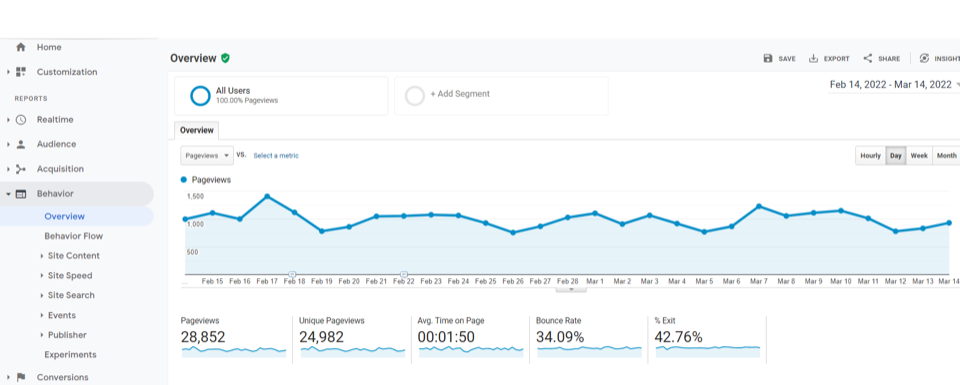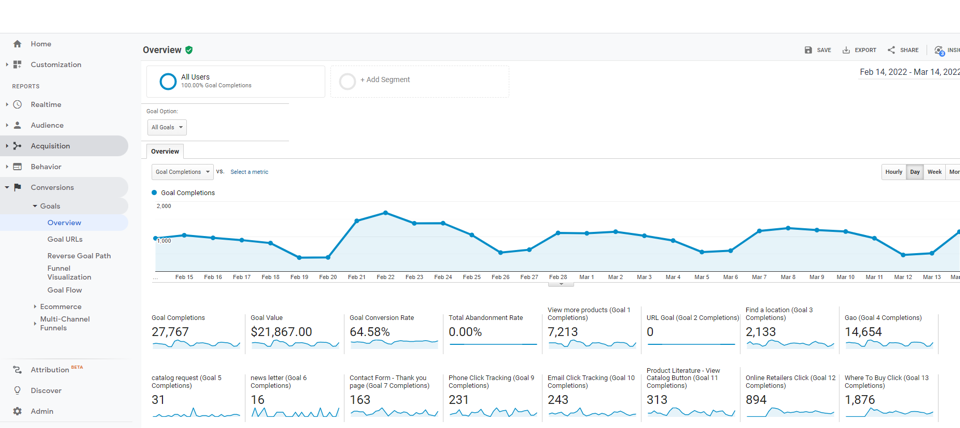The key to effective marketing lies in your ability not only to leverage top marketing strategies but also to ensure that they produce the desired results. If your strategies fall short of your business goals, you need to make the necessary adjustments. But how exactly do you track your most essential marketing activities, and which should you analyze most closely as you execute your marketing strategy? In this guide, we’ll take a closer look at the top twenty digital marketing KPIs you need to monitor for optimal success in your marketing endeavors.
What Are Marketing KPIs & How Do They Impact Your Marketing Strategy?

Source: OnStrategy
If you’re new to digital marketing, you need to understand what marketing KPIs are before you learn how to leverage these key metrics for digital marketing. Simply put, marketing key performance indicators (KPIs) are marketing metrics that analyze marketing activity and measure output to help business owners better understand how well their various marketing strategies are performing. For example, if you’re executing a new social media ad campaign, digital marketing KPIs like shares and engagement can help you analyze where your marketing efforts are paying off and where you need to make changes to achieve better results.
That being said, KPIs on their own are not enough to help you get more out of your marketing campaigns. According to Google, approximately 95% of marketers agree that “to truly matter, marketing analytics KPIs must be tied to broader business goals.” To get the most out of your metrics, you need to have achievable goals for your marketing strategy that can be measured by the KPIs you focus on. For instance, you might rely on social media digital marketing KPIs to assess the success of your plans for growing your audience to a certain number of followers or boosting your sales by x percent. Each KPI offers greater insight into the efficacy of your marketing strategies.
Before we dive into the twenty top marketing KPIs listed below, it’s also important to note that not every KPI is going to be relevant to your particular marketing goals. You will likely want to prioritize metrics that directly affect your bottom line. Therefore, metrics like conversion rate optimization and average order value, which focus on revenue, may be most important to your business. Each one of the digital marketing KPIs that you prioritize should serve to provide you with greater insight into specific areas of your overall strategy.
With a better understanding of what marketing KPIs are, why they’re important, and what role they play in your digital marketing strategy, let’s take a look at 20 key metrics for digital marketing you should be monitoring.
20 Digital Marketing KPIs You Must Monitor
There are several components to every digital marketing strategy that requires you to focus on different KPIs across strategies to measure output. In this guide, we’re going to separate some of the top digital marketing KPIs by channel to help you determine which key metrics are going to be the most helpful in marketing strategy. Let’s dive in!
SEO KPIs

Believe it or not, approximately 90.63% of all pages get zero traffic from Google. That’s a huge number of websites that are failing to leverage SEO to generate organic traffic that will help them generate leads and drive sales. The good news? With the right strategy, you can begin gaining the online visibility your business demands. But which digital marketing KPIs are the most critical to focus on as you work on your SEO strategy?
- Domain/Page Authority: Domain and page authority play a crucial role in on-page SEO, dictating which keywords you’ll be able to rank for and how you measure up to your competition. Keep a close eye on DA and PA as you publish new content and grow your website.
- Search Traffic: Search traffic helps you better understand how many people you are reaching organically and will help you forecast SEO performance to fine-tune your SEO strategy over time.
- Backlinks: The more Dofollow backlinks you have from authoritative websites, the more authoritative your website will appear to Google, and the higher the search engine will rank your pages.
- Keyword Rankings: Keywords play a vital role in your on-page SEO. Exchanging keywords that are less effective for keywords that drive traffic should be a major focus of your SEO strategy.
- Bounce Rate: Bounce rate is one of the most informative digital marketing KPIs, showing you how many of your visitors visit a page and leave rather than visiting other pages on your website. Pages with high bounce rates will need to be optimized to better meet your customers’ needs and keep them on the page (and your site) longer.
Social Media KPIs
Among the top key metrics for digital marketing that you should have your eye on are your social media KPIs. The total number of social media users across the world is expected to reach a whopping 4.41 billion in 2025. Getting your content in front of an audience and growing brand awareness and interest is critical to your success. But which digital marketing KPIs should you be tracking throughout your campaigns?
- Follower Growth Rate: How many followers are you gaining over time? This metric can be an indicator of how well your marketing strategies drive engagement and traffic to your site.
- Reach and Impressions: You want your online visibility to skyrocket over time. Tracking reach and impressions can show you who your content is getting in front of and what it means in terms of engagement.
- Likes/Comments/Shares: Engagement is essential for your social media campaigns. Are your followers liking, commenting, and sharing your content? Consider both the quantitative data and real-time feedback from your customers when you’re tracking these digital marketing KPIs.
- Social Media Traffic: Much like with your website, assessing your social media traffic will tell you how many people are viewing your pages. This data can help you improve the quality of your content and generate more traffic.
- Social Media Conversions: Social media is important for brand visibility and awareness, but it’s also an excellent tool for driving sales. Track your social media conversions to see how well your pages on social platforms are helping you convert leads and drive sales on your website (or directly on social media, if you’re using a platform that gives users the ability to buy products directly from your page).
Ecommerce KPIs

Ecommerce businesses have flourished in recent years, with platforms such as Shopify and BigCommerce making it easier than ever for you to establish your own digital storefront. Digital marketing KPIs pertaining to ecommerce are especially important to track because they will mean the difference between spending money on ineffective strategies and bringing in the revenue you need to thrive. A few key metrics for digital marketing in your ecommerce strategy to measure include:
- Cost Per Visit: Advertising costs money, and you can estimate your cost per visit by analyzing your total visits in comparison to your ad spending. Of course, you don’t have to stop here. A few other digital marketing KPIs that are especially helpful for business owners in the ecommerce space include cost per acquisition, cost per click, and cost per thousand impressions.
- Sales Revenue: Sales revenue not only tells you how much your business is bringing in but can also help you predict future revenue trends to create valuable projections that will help you drive your business forward.
- Average Conversion Rate: Conversion rates give you a better idea of how many of your visitors are completing a sale so that you can adjust marketing strategies to improve these rates over time.
- Cart Abandonment Rate: There are multiple steps to driving conversions, and you may find that some of your visitors are abandoning their carts rather than completing their sales. Your cart abandonment rate not only lets you know how many visitors are leaving their carts but, along with other digital marketing KPIs, can help you figure out which strategies you need to employ to encourage them to follow through on their purchases.
- Average Order Value: Along with sales revenue, average order value can offer helpful insight into how much your customers typically spend and what that might mean for future profits.
Email Marketing KPIs
Email lists can be a great way to develop a personal relationship with subscribers and deliver value in the form of promotions or information. While there is a myriad of email marketing strategies you can employ to encourage conversions and boost engagement, the digital marketing KPIs that you’ll track throughout your email marketing campaigns are relatively straightforward. To ensure you’re making the right impact, track these key metrics for digital marketing.
- Open Rate: Your open rate illustrates how effective your subject line is and whether or not it encourages your recipients to take action and engage with your business. You can use this rate to test out your email marketing strategies and improve your approach.
- Click-Through Rate: Your email click-through rate or CTR is different from other digital marketing KPIs like your open rate because it shows you whether or not your subscribers are clicking on the links contained in your emails. You need to see how many users are actually engaging with your emails to drive conversions.
- Unsubscribe Rate: The last thing you want is for your email list to dwindle because people are unsubscribing. Your unsubscribe rate paired with survey data can help you learn more about why people are leaving and what you can do to reduce these rates.
- Bounce Rate: You definitely don’t want a high bounce rate. Bounce rates indicate the percentage of your emails that are being returned to you because the email account is unable to receive your emails. Higher rates can be an indication of an old list that needs to be updated.
- Sign-Up/Conversion Rate: Finally, you want to make sure that your emails are producing the desired effects (getting people to sign up for content or purchase your products and services). These key metrics for digital marketing can also better help you understand what changes you can make in your digital marketing strategy to get more of your email subscribers to engage with your business and make a successful purchase.
You Don’t Have To Do Digital Marketing Alone
To succeed, your digital marketing strategy must be based on a deep understanding of your target audience, your competitors, and the various tactics that will effectively gain interest and help your business sell products or services. That being said, it’s only through specific business goals and digital marketing KPIs that you will be able to understand how well each of your digital marketing strategies is working and where they can be improved.
The problem? Tackling all of this on your own can seem like a major undertaking, especially when your focus is split between multiple areas of your overall digital marketing strategy. Fortunately, there’s plenty of help out there to support your marketing endeavors and help you get the best possible results. For example, if you’ve just launched your website and you need help boosting your authority and generating organic traffic, BESTSEO makes it easy to find the right SEO and digital marketing agencies that can help you effectively market your business and hit your key metrics.
If the guide on digital marketing KPIs is helpful, we have plenty of resources to help your business. Follow the BESTSEO blog to learn more about SEO best practices and how to apply them to benefit your company.

